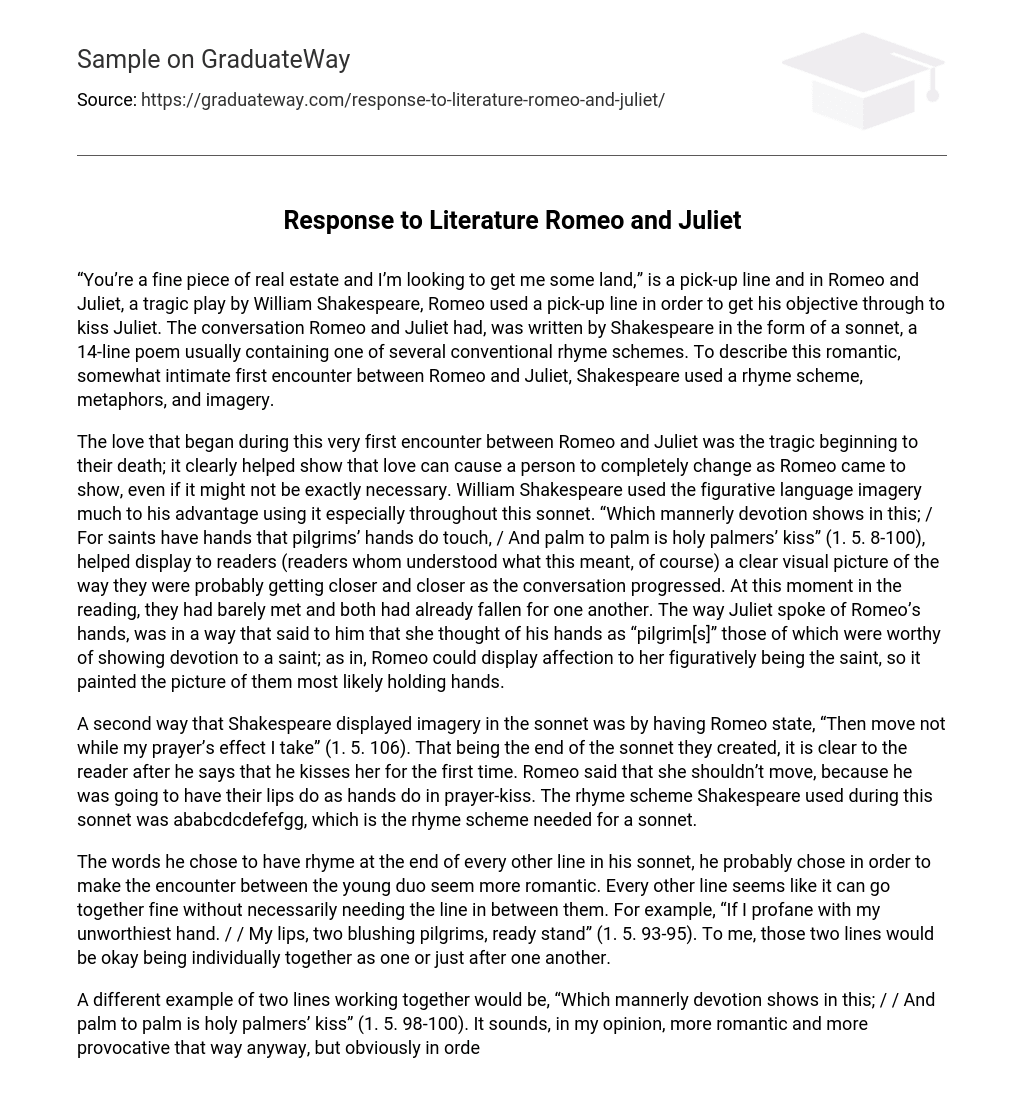“You’re a fine piece of real estate and I’m looking to get me some land,” is a pick-up line and in Romeo and Juliet, a tragic play by William Shakespeare, Romeo used a pick-up line in order to get his objective through to kiss Juliet. The conversation Romeo and Juliet had, was written by Shakespeare in the form of a sonnet, a 14-line poem usually containing one of several conventional rhyme schemes. To describe this romantic, somewhat intimate first encounter between Romeo and Juliet, Shakespeare used a rhyme scheme, metaphors, and imagery.
The love that began during this very first encounter between Romeo and Juliet was the tragic beginning to their death; it clearly helped show that love can cause a person to completely change as Romeo came to show, even if it might not be exactly necessary. William Shakespeare used the figurative language imagery much to his advantage using it especially throughout this sonnet. “Which mannerly devotion shows in this; / For saints have hands that pilgrims’ hands do touch, / And palm to palm is holy palmers’ kiss” (1. 5. 8-100), helped display to readers (readers whom understood what this meant, of course) a clear visual picture of the way they were probably getting closer and closer as the conversation progressed. At this moment in the reading, they had barely met and both had already fallen for one another. The way Juliet spoke of Romeo’s hands, was in a way that said to him that she thought of his hands as “pilgrim[s]” those of which were worthy of showing devotion to a saint; as in, Romeo could display affection to her figuratively being the saint, so it painted the picture of them most likely holding hands.
A second way that Shakespeare displayed imagery in the sonnet was by having Romeo state, “Then move not while my prayer’s effect I take” (1. 5. 106). That being the end of the sonnet they created, it is clear to the reader after he says that he kisses her for the first time. Romeo said that she shouldn’t move, because he was going to have their lips do as hands do in prayer-kiss. The rhyme scheme Shakespeare used during this sonnet was ababcdcdefefgg, which is the rhyme scheme needed for a sonnet.
The words he chose to have rhyme at the end of every other line in his sonnet, he probably chose in order to make the encounter between the young duo seem more romantic. Every other line seems like it can go together fine without necessarily needing the line in between them. For example, “If I profane with my unworthiest hand. / / My lips, two blushing pilgrims, ready stand” (1. 5. 93-95). To me, those two lines would be okay being individually together as one or just after one another.
A different example of two lines working together would be, “Which mannerly devotion shows in this; / / And palm to palm is holy palmers’ kiss” (1. 5. 98-100). It sounds, in my opinion, more romantic and more provocative that way anyway, but obviously in order for it to be a sonnet, which is not the way to go. Using metaphors was another way that Shakespeare enlightened the moment that Romeo and Juliet realized it was meant to be. The very first example of a metaphor in the sonnet was in the first few lines which were Romeo’s; “If I profane with my unworthiest hand. This holy shrine, / the gentle sin is this: / My lips, two blushing pilgrims”(1. 5. 93-95) In these few lines, Romeo connects Juliet’s body with that of a “holy shrine,” also saying that his hands were unholy, blushing pilgrims which were unworthy of touching the statue. A different use of a metaphor in this sonnet would be a few lines later, when Juliet says, “Ay, pilgrim lips that they must use in prayer” (1. 5. 102). Saying this, she compared her lips to hands during prayer.
Through reading this part of Romeo and Juliet I realized that by using even a little bit of figurative language you can get any type of message across. I read and analyzed imagery, the rhyme scheme, and metaphors used in this sonnet. Romeo and Juliet both ended up smitten with one another by the end of this first conversation. They both seemed to have changed almost immediately due to one another because at first, Juliet was timid and acted young and in the end realized what was occurring and allowed any maturity she had take over.





